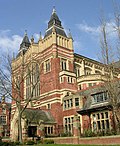Alastair Watt Macintyre Hay OBE (born April 1947)[1] is a British toxicologist, and a Professor of Environmental Toxicology; he works primarily in the fields of chemical warfare and biological warfare (CBW).[2]
Education
Hay gained a Bachelor of Science degree in Chemistry in 1969, in London, though had started with Maths and Chemistry, and a PhD in Biochemistry in 1973 for research on the metabolism of fructose (fructolysis) in the liver.[3]
Career and research
Hay started his career at the chemical pathology department at the University of Leeds. He became Professor of Environmental Toxicology.[when?][4]
He provided assistance to the forming of the Chemical Weapons Convention in 1993, becoming international law in 1997. He works in the Leeds Institute of Cardiovascular and Metabolic Medicine.[citation needed] In 1995 he worked with Physicians for Human Rights (PHR). In 2004 he helped prepare the World Health Organization's (WHO) manual: Public health response to biological and chemical weapons.[5]
Hay is an active advocate for promoting ethics to new generations of scientists,[6] and he has headed a group of the International Union of Pure and Applied Chemistry (IUPAC) for educational materials on chemical warfare,[7] which led to the creation of an online resource on "Multiple Uses of Chemicals".[8] He has also represented the IUPAC for preparation of the Biological Weapons Convention (also known as the Biological and Toxin Weapons Convention).
Publications
- No fire, no thunder: the threat of chemical and biological weapons, Pluto Press, 1984, ISBN 0861047389
- A Magic Sword or a Big Itch: An Historical Look at the United States Biological Weapons Programme, Medicine, Conflict and Survival, 1999
- Simulants, Stimulants and Diseases: The Evolution of the United States Biological Warfare Programme, 1945–60, Medicine, Conflict and Survival, July 1999
Awards and honours
He was awarded the 2015 OPCW-The Hague Award by the Organisation for the Prohibition of Chemical Weapons.[9][10] Hay was appointed Order of the British Empire (OBE) in the 2003 Birthday Honours for services to occupational health.[11]
References
- ^ "Alastair Watt Macintyre HAY". companieshouse.gov.uk. London: Companies House.
- ^ Al-Khalili, Jim (2018). "The Life Scientific, Banning chemical weapons with Alastair Hay". bbc.co.uk. BBC.
- ^ Hay, Alastair Watt MacIntyre (1973). Fructose metabolism in the liver. royalholloway.ac.uk (PhD thesis). University of London. ISBN 9781339614472. OCLC 1065396333. EThOS uk.bl.ethos.704241.
- ^ "Alastair Hay: It is vital America discloses what weapons were deployed". Independent.co.uk. Archived from the original on 2016-03-07.
- ^ "World Health Organization".
- ^ Kingston, Peter (11 November 2008). "Interview: Alastair Hay, weapon of mass instruction". The Guardian.
- ^ "IUPAC Latest News". IUPAC - International Union of Pure and Applied Chemistry.
- ^ "Multiple Uses of Chemicals". multiple.kcvs.ca. Archived from the original on 2018-06-27. Retrieved 2018-06-20.
- ^ "OPCW-The Hague Award - Past Winners". Archived from the original on 2018-06-20. Retrieved 2018-06-20.
- ^ OPCW (19 July 2016). "Alastair Hay's Acceptance Speech at the 2015 OPCW-The Hague Award" – via YouTube.
- ^ Anon (2003) "No. 56963". The London Gazette (1st supplement). 2003-06-14. p. 11.










You must be logged in to post a comment.